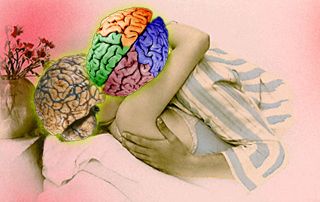
A man sneaks away from his wife and kids and their suburban homestead, and descends into a dungeon late at night, allows a dominatrix to strap him to a rack, and has his testicles electrified. How does the rational science of biological evolution make sense of the man who gets off on this? It's a vital question. You can call this guy a freak of nature, but there are many like him, seeking similar strange kicks, far removed from "reproductive success."
Despite the recent efforts of the Kansas Board of Education, many people understand the basic tenet of evolutionary theory -- the interaction of a species' genetic makeup with its environment is the process that is responsible for the vast configurations of life on the planet. We call it natural selection.
Sociobiologists, accordingly, have attempted to elucidate the spectrum of human behaviors in terms of evolution, but they find themselves facing big problems when explaining sexual activities. This is certainly ironic, since the act that transmits our genetic code would seem most effectively described by evolutionary theory.
Indeed, we modern humans do very odd and problematic things with our sexuality, things that can't be satisfactorily explained as mere "mistakes" of evolution. We commit to celibacy, have sex with the same gender, use birth control, and fetishize our lifestyles beyond anything a Darwinian geneticist can possibly explain.
The confounding and seemingly anti-Darwinian nature of contemporary sex practices is one of many issues explored in Susan Blackmore's The Meme Machine. This book expands the field of memetics, pioneered by popular science writer Richard Dawkins, into new areas, and provides powerful explanations for cultural dynamics that have long perplexed evolutionary scientists. According to Blackmore's theory, memes -- like genes -- are "replicators." They seek, at all costs, to make copies of themselves. In the process, they affect the behavior of the "vehicles" that carry them -- humans.
But unlike genes, they can spread "horizontally" (from one brain to another, regardless of the genetic relationship) as well as "vertically" (from parent to child, and even child to parent). For instance, the thesis of this article is a meme that has copied itself from my brain, to the Internet, to your brain, even though we've never met and are probably not related. Genes, on the other hand, can only copy themselves vertically, from generation to generation, through biological reproduction.
Also, unlike genes, the biological fitness of the meme carrier doesn't necessarily impact on the spreading of the meme. If someone commits suicide in political or religious protest and witnesses are so impressed they take up that person's cause, then the meme he was carrying has won. It has successfully copied itself, perhaps more successfully than if that person had not committed suicide.
Genes, on the other hand, rely on biological reproduction. While they're apathetic about the fate of their vehicles after they reproduce (note the bodily effects of the female who is no longer of reproductive viability), breeding is an imperative for gene survival. If a given person dies before reproducing, regardless of political or religious intent, the genes lose.
This means that the two replicators, the genes and the memes, are often in competition for the resources of the human vehicles. This may account for the bizarre behaviors for which biological evolution cannot. (Blackmore uses the "second replicator" theory, a major aspect of her thesis, to elucidate all sorts of phenomena, from human brain size, to the origins of language, to the Internet.)
So, let's return to our man who deliberately seeks out cock and ball torture. Electrifying his scrotum might actually make him impotent -- a definite genetic disadvantage. But from the memetic perspective, his action makes perfect sense.
You see, he is the carrier of the "genital torture" meme. The man has either heard about or seen images of this behavior at some point. When this "informational unit" entered his brain, it found a comfortable home (perhaps he has other memes that caused him to perceive himself as deserving of punishment). The man is likely to now serve the cause of the meme further. Maybe he'll meet others in the fetish community and communicate the practice, and a few will practice it themselves. We have successful memetic replication!
From a wider perspective, the memes are now harnessing the biological energy of sexual desire to serve themselves at the expense of genes. Instead of devoting their lives to their genes' survival by breeding offspring and raising kids who in turn might start families, people bathe themselves in the information-rich behavior of fetishes, associating with other fetishists who are susceptible to being infected with ever-more fetishistic memes.
Until the memes finally work out a way to do away with the need for humans altogether, I think it's clear that the further we wander from our genetic imperatives without sacrificing our ability to spread memes, the more useful we are to our true masters.
Jeff Diehl is a memetic mutation.
